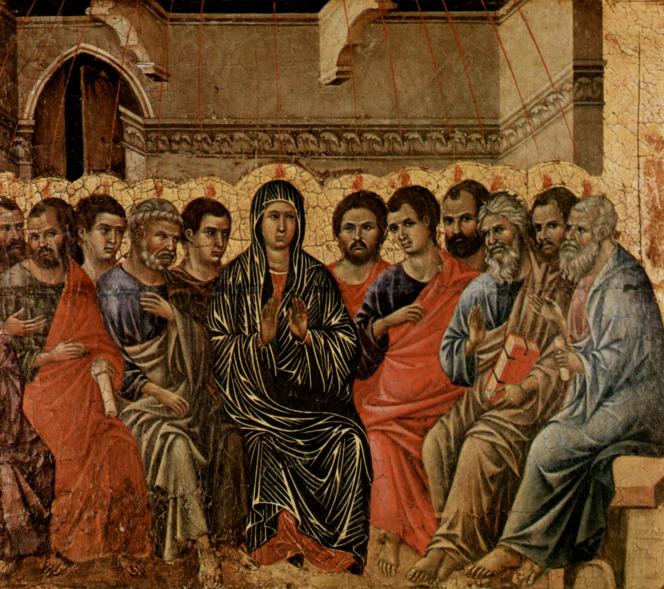Maintenance. In Greek, the term pentekostê means “fiftieth”. According to Christian tradition, it was indeed fifty days after the Resurrection of Jesus that his disciples, gathered for the Jewish holiday of Shavuot, received “the strength of the Holy Spirit”.
This founding episode, which marks the beginning of the Church, is recounted in the Acts of the Apostles. This New Testament book depicts the universalization of the message of Jesus, from the first persecutions in Jerusalem to the evangelization of Rome, as explained here by theologian Odile Flichy.
Odile Flichy. The hypothesis which currently tends to prevail is that of a single author, Luke, of a work in two volumes: his Gospel and the Acts of the Apostles, composed at the end of the first century. The possibility of two different authors or that of a single work divided into two are no longer defended today.
Luke can therefore be considered the first historian of Christianity, which he himself claims at the beginning of his Gospel. It first tells the story of the work of Jesus and then, together with Acts, tells how the apostles continued his mission; the events begin shortly after the death of Christ, around 33 or 34, and end after Paul’s arrival in Rome around 64. Luke would therefore have written about twenty years after the events.
The event is announced from the ascension of Jesus, which Luke recounts twice, at the end of his Gospel and at the beginning of Acts, in a sort of narrative tile. Jesus then said to them, “You will be my witnesses. The term is crucial, because for Luke, it is having witnessed the resurrection that defines an apostle – in his eyes, therefore, Paul is not one. But, we often forget, these twelve apostles symbolize the peoples of Israel and this event of Pentecost, which takes place in Jerusalem, is only for the Jews. According to the theology of Luke and Paul, the announcement of the Good News will be made first to Israel before being revealed to the rest of the world.
Luke relates the facts with the usual lexicon of theophany: the Holy Spirit is manifested by noise, wind and tongues of fire. These mean that henceforth the apostles will be able to speak to all peoples in a way that they will understand. Universality is thus announced, explicit in Peter’s first discourse at the time of Pentecost. As Jesus warned at the beginning of Acts: “You will receive strength when the Holy Spirit comes upon you; then you will be my witnesses in Jerusalem, in all Judea and Samaria, and to the ends of the earth” (Acts 1:8). The whole itinerary followed in the Acts, from Jerusalem to Rome, shows this progressive openness to the universal.
Acts contains a series of key events. Pentecost in chapter 2 concerns only Israel, but the death of Stephen [first deacon and first martyr of the Church, editor’s note] in chapter 6 obliges Hellenist members, that is to say Greek-speaking Jews of the community, to leave Jerusalem. Then begins the evangelization of Samaria by Philip, according to the program announced by Jesus. Just after (chapter 9), Paul is converted following the famous episode of the road to Damascus. This announces the preaching to the non-Jewish world, but the one who is still called Saul is a Jew… How is he going to do it?
Chapter 10, which sits between this conversion and Paul’s preaching, gives the answer. Meeting Corneille, Peter said to him: “You know that it is forbidden for a Jew to bind himself with a stranger or to enter his house; but God taught me not to regard any man as filthy and unclean. (10, 28) This verse is crucial, because Peter indicates to the reader that it is God himself who gave the law and that evangelization outside the Jewish world is part of his plan. Acts thus tells the Jews that God has not abandoned them and that the election is not in question, and to the pagans that the message also concerns them because salvation is for all.
Luke summarizes them in the three “summaries” of Acts, summaries that punctuate the narrative. The first, which evokes community life (Acts 2, 42-47), underlines the testimony of faith that it constitutes and the increase in the faithful that it entails. The two following summaries (Acts 4, 32-35 and 5, 12-16) confirm, by giving a more precise description, the concrete character of this evangelical witness under three aspects: sharing of goods, signs and wonders, success with the people. These summaries insist on the parallelism between the mission of Jesus and that of the apostles. Many episodes of Acts are moreover constructed in symmetry with passages from the Gospel.
Invested with the power of the Holy Spirit, the apostles proclaim the resurrection of Christ and act in the image of their master, according to the mission he entrusted to them by healing the sick and driving out unclean spirits. Luke takes care to distinguish Christian missionaries from the many thaumaturges [sorcerers, magicians, editor’s note] of the time by always accompanying these prodigies with words. When Philip arrives in Samaria, a man named Simon is already doing magic there by claiming it; Philip performs the same wonders, but explains that they belong to Jesus, thus marking a singularity of Christian speech, which avoids confusion between what is given by the Holy Spirit and the rest.
Luke credits Paul with the ability to address all cultures with words they can understand. In all his missionary journeys, Paul goes first to the synagogue before going to speak to non-Jews. Moreover, he himself did not convert, since Christ is the Messiah promised to Israel. When he addresses the Jews of Antioch (chapter 13), he recalls the link between the Gospel and the Old Testament, emphasizing that God had promised a descendant to David and speaking to them of the notion of salvation which is familiar to them. . On the other hand, when he discourses before the Greek philosophers (chapter 17), he makes no reference to the Bible or to Jesus. He draws their attention to the “unknown god” on one of their altars, explaining to them that it is the Lord of heaven and earth whom he comes to announce to them.
In this sense, I believe that the Acts of the Apostles speak to us directly because this text invites us to find words that make sense for the audience for which they are intended. In this, the figure of Paul is very current, and testifies to a formidable relationship with the world by showing us that the Christian message can be heard by everyone on condition of not being locked up in his little chapel. It is an effort towards otherness.
Community life, announced in the Gospel, is presented in an exemplary, even idealized way, in the first summary which concludes the episode of Pentecost. It is based on prayer, the sharing of bread, the community of riches, fraternal communion and preaching. Luke wants to prove that the evangelical witness does not consist only in good words, but is also realized in deeds.
This episode comes just after the summary on community life, and in particular the example of Barnabas who placed the money from the field he sold at the feet of the apostles. It is after this idyllic story that Ananie comes to show, as a counter-example, that the community is not ideal. This first sin within the Church is interpreted by Peter as the evil presence of Satan, who seeks to divide the Church.
The exegete Daniel Marguerat offers an interesting reading of the gesture of Ananias. According to him, the event moves the first Christians from the community to the Church. The first mention of the word “Church” comes just after the episode of Ananias, in chapter 5. It then has nothing in common with the institution which will be created later: it designates only the assembly of believers. By showing that the community was not perfect, Ananie brings it out of its initial idealization. From this moment when it becomes fallible, the Church can exist. The event, recounted on the pattern of Genesis, contains a message analogous to that of the fall of Adam and Eve: sin kills.
Luke indeed closes the Acts in the middle of Paul’s speech. By this process, he does not interrupt him and therefore lets it be understood that he is still talking, that is to say talking to us.














